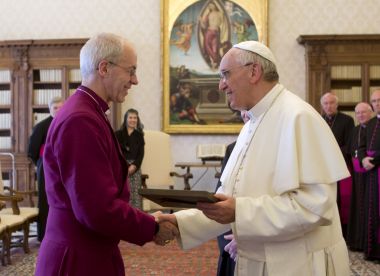The authority of religious leaders has fallen - poll

The public is increasingly interested in religious leaders, but no longer affords them the authority they used to possess, a new survey shows.
To influence people and make a difference in today's world, religious leaders not only have to possess personal charisma as well as an important post, but they have to show they have triumphed over personal struggle and strife of their own.
The YouGov poll was commissioned by The Tablet, the Catholic weekly, to mark its 175th anniversary which is being celebrated today with a Mass at Westminster Cathedral in London.
Linda Woodhead, professor in the sociology of religion at Lancaster University, analysing the results, writes in The Tablet: "These are not easy times in which to be a religious leader. The public is increasingly interested in you, but doesn't necessarily embrace what you say."
She says the poll sheds fresh light on Pope Francis's popularity, and the nature of the challenge he faces.
More than 3,000 adults were polled by YouGov.
The Tablet found that the Archbishop of Canterbury Justin Welby was the religious leader found to have made the "best contribution" to moral and religious life in Britain. Pope Francis was joint second with the former Archbishop of Canterbury Rowan Williams.
In terms of who made the most favourable impression of global leaders, the Dalai Lama was first with 57 per cent, Desmond Tutu second with 46 per cent, Pope Francis third with 40 per cent and Oprah Winfrey next with 21 per cent.
Professor Woodhead writes: "So to be among the most popular – and therefore influential – religious leaders, it seems that a person has not only to have the authority of office... but has to have achieved something remarkable through their own efforts and struggle."
She says the British are particularly impressed by leaders who have made stands for the marginalised.
Charisma and empathy were also important, as well as something she describes as the "transcendence factor". She writes: "Their followers feel that they really care for them, and are on their side, in a way that few other authority figures seem to be."
But she also acknowledges that for all their leadership qualities, the message from the poll is that religious figures no longer have the authority they once did.
In another YouGov poll about the election, The Tablet found that a huge swing by Catholics away from Labour contributed to the dominance of the Scottish Nationalist Party in the results.
Nearly half of Catholics polled in Scotland had said they were planning to vote for the SNP compared with 38 per cent for Labour. In Britain as a whole, 41 per cent said they planned to vote Labour and 31 per cent Conservative. In 2005 an Ipsos MORI poll for The Tablet found that 53 per cent of Catholics were Labour supporters.
To mark its anniversary, The Tablet also published a list of its top 100 lay Catholics.
"When the first issue of The Tablet appeared in 1840, the advances made by Catholics in society in the next 175 years would have been unimaginable," the newspaper says. After centuries of persecution, the hierarchy had still not been restored and the legal restrictions against Catholics becoming MPs and entering the civil service and the judiciary had only just been removed.
The governor of the Bank of England Mark Carney is at the top of the list with Sir Michael Wilshaw, Chief Inspector of Schools, in second place and Robert Hannigan, director of GCHQ, in third.











